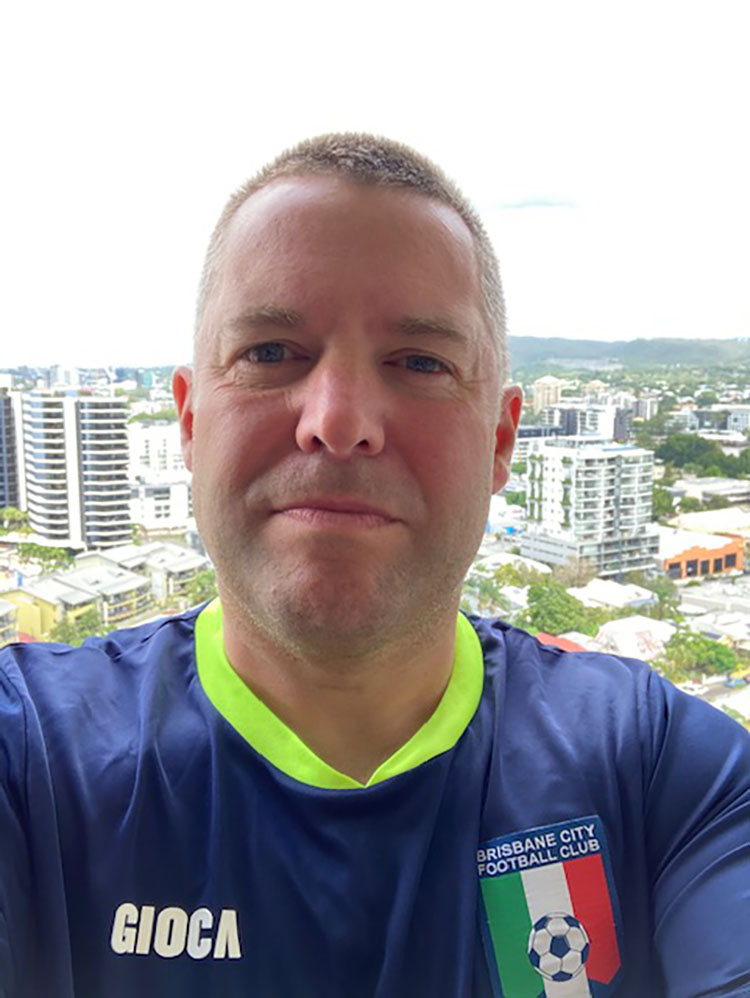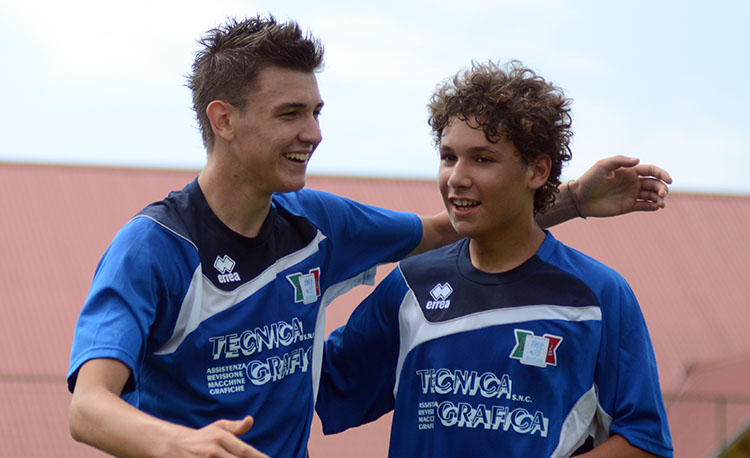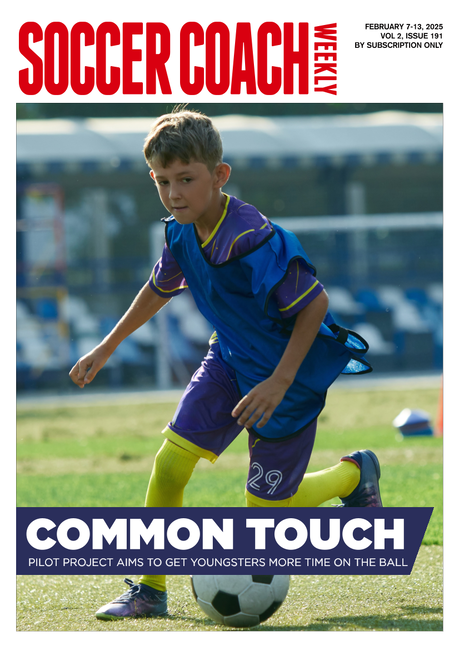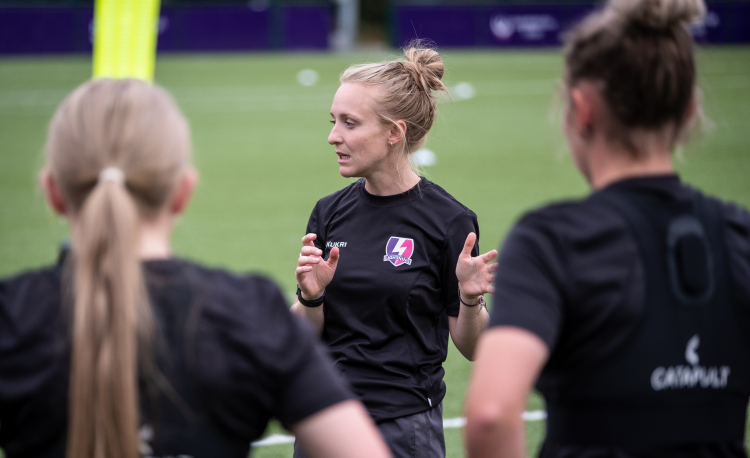'Players can come out of nowhere to make it'
Coaching Adviceby Frank Lopez
With a coaching career rooted in youth development, FRANK LOPEZ discusses preparing young players for the step up to adult soccer with STEPH FAIRBAIRN
Since his coaching journey began in 2004, Frank Lopez has built up a wealth of experience in youth soccer, as well as the male and female adult game.
He has spent time in London at Barnet FC academy, and at AFC Wimbledon, where has coached in the academy with the women’s first team.
Having achieved his A License in 2018, Frank recently moved from London to Brisbane for a second time. He is now the Under-23s coach at Brisbane City FC.
SCW caught up with Frank to talk about academies, how coaches can go about preparing youth team players for senior football and what the appropriate level of challenge looks like...

Englishman Frank Lopez is Under-23s coach at Australian side Brisbane City, having previously worked at the academies at London clubs Barnet and AFC Wimbledon
SCW: What is your take on academies and what age we should start looking to get kids into those more formal structured football settings?
FL: "It's a tricky one. A lot of academies start with under-eights, under-nines and the likelihood, statistically, is that whoever you've got in, say, an under-nines team, they're unlikely to go on to be professionals. “Bayern Munich scrapped their academy below under-12s and decided their money will be better spent building relationships with local clubs to assist with the coaching standard, so that more players would have access to better coaching and align a little bit with the Bayern philosophy, rather than concentrating all their funding into just their own academy squads, which would be a much narrower group of players. “I don't know how many clubs have followed that in England but it's certainly something that was discussed widely across a lot of coaches at academy level. "Brentford scrapped their academy entirely - again, they probably felt it was more cost-effective, but also strategically, they were probably better just casting their net wider, rather than focusing their efforts on just their own youngsters. “There's no right or wrong answer, it depends on the club approach."
SCW: When you coach, how aware are you that you might be coaching potential senior players? Has that been part of your focus?
FL: "This varies from club to club, as well. One club, which I've not worked at but were a Premier League club, were well known for focusing their coaching on two or three standout players from each age group, with the other players intended to give them the platform of a team, with the expectation that those players would go on and make it."It never ceases to amaze how players can come out of nowhere and make it...""Most clubs don't do that. But there are always discussions within academies of the likely players to be retained at the end of their two-year cycle. "So, typically, an under-12s player will either be retained for another two years, or released. Usually along the way, they're given markers of how they're doing so the hope is that when it comes to release or retain, it's not a shock to a player if they're released. "That's something clubs try to have in place. But it never ceases to amaze me just how players sometimes come almost out of nowhere and make it. "There's a guy in the AFC Wimbledon first team now who has been really successful for two or three years, and he came in from a grassroots club at under-14. "Then you've got another teammate of his in the first team who has been all the way through the academy system at AFC Wimbledon from under-nines. "Equally, there are players who you would perhaps think are on the cusp of not being retained at under-14s and they go on and really succeed. "There's one such player I can think of who was in one of the age groups when I was in an academy who went on to get success with the England youth set-up. They're not necessarily ones that you see coming when they are younger. "Equally, standout players at under-14s sometimes don't develop technically or tactically during those key teenage years. By under-17s, they're back to playing non-League when maybe that wasn't the expectation when they were a bit younger."
SCW: Is it dangerous to make assumptions early on about who might go on to be professional?
FL: "As long as you're always prepared to challenge your belief about a player at any one moment, I don't think there's anything wrong with giving a little more focus to your most talented under-13 or under-14. "But, have in mind that another under-13 who might not be an obvious standout might find an inner motivation suddenly that wasn't there a year ago, that will drive them to be the best they can. "Someone who perhaps was coasting a bit might suddenly think, 'wow, I want this, I really want to improve myself'. whereas another might have other distractions and go off the boil a bit. “If you have your strongest players onside, it helps to get the respect of the group. But be prepared to challenge your views about which players are most likely to get through. "Always be reviewing that and be prepared that some will suddenly have a breakthrough season, and perhaps those you thought were in the lead might fall back.”
Frank Lopez recommends remembering that Under-14s, like these representing Brescia, can suddenly surpass your expectations for them if they knuckle down
SCW: Senior football is tough on an emotional mindset level. Are there ways we can prepare youth players for some of the tough times that might lie ahead?
FL: "To make it professionally, you have to develop mental and physical resilience. From a physical perspective, you have to be able to perform when you are tired and your body is wanting you to stop. So you have to find that proverbial extra 10%. “But also, mentally, there'll be times when it's not your best day and you have to dig deep and perhaps trust the technique you spent hours working on, or find a way to mentally unblock yourself. "How do you turn a bad performance into an okay performance or an okay performance into good performance? “Mental and physical resilience are important. It can be hard when you're coaching a group of players to almost, at times, set them up to fail. "But that can help development, if done in the right way. And if a player perhaps doesn't meet a challenge at a certain time, how do we help them fight through that?"If a player doesn't meet a challenge, how do we help them fight through that...?"“If we're looking to get them into a high-performance environment, we need to offer players challenges sometimes they're not perhaps ready for, so they can break through whatever their ceiling is at that moment. "Sometimes they will make it and will have a huge smile and self-satisfaction when they do, and sometimes they won't. How can we work with them to overcome that?"
SCW: Do you think a big part of it is players having trust in you as a coach to allow you to do that?
FL: "It's probably a two-way thing. I think trust from the player develops through challenges. "If we give them an easy ride, players can coast. If we can give them an appropriate challenge - something that pushes them, but we feel they can achieve - then you can get a feeling as a player and a coach of making that leap together. That helps build trust. “You also have to trust yourself, which isn't always easy: are you doing the right thing by the player? Also, you have to put some trust in the player as well. "Sometimes you might see a player is not quite ready for it. Or sometimes they'll surprise you and they're ready for more than you realised."
"in my experience, you barely cover your expenses. To do yourself justice at academy level, you have to put in 20-30 hours a week..."
Hear the full interview with Frank, including his views on the financial dilemmas facing coaches at academy level, ON OUR PODCAST — click here to downloadNewsletter Sign Up
Coaches Testimonials

Gerald Kearney, Downtown Las Vegas Soccer Club

Paul Butler, Florida, USA

Rick Shields, Springboro, USA

Tony Green, Pierrefonds Titans, Quebec, Canada
Subscribe Today
Discover the simple way to become a more effective, more successful soccer coach
In a recent survey 89% of subscribers said Soccer Coach Weekly makes them more confident, 91% said Soccer Coach Weekly makes them a more effective coach and 93% said Soccer Coach Weekly makes them more inspired.
*includes 3 coaching manuals
Get Weekly Inspiration
All the latest techniques and approaches
Soccer Coach Weekly offers proven and easy to use soccer drills, coaching sessions, practice plans, small-sided games, warm-ups, training tips and advice.
We've been at the cutting edge of soccer coaching since we launched in 2007, creating resources for the grassroots youth coach, following best practice from around the world and insights from the professional game.






